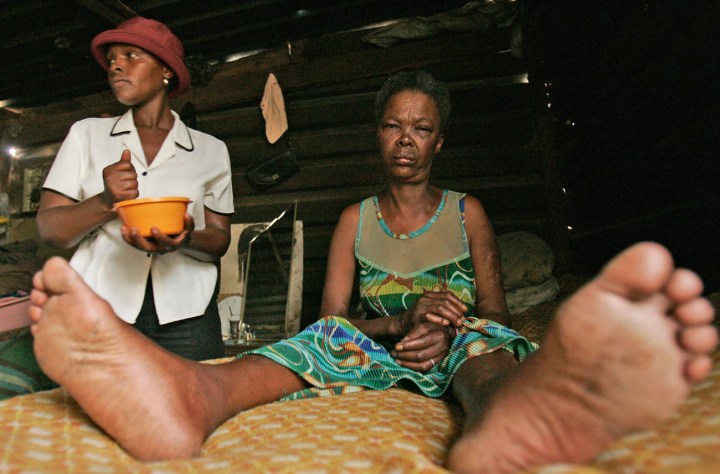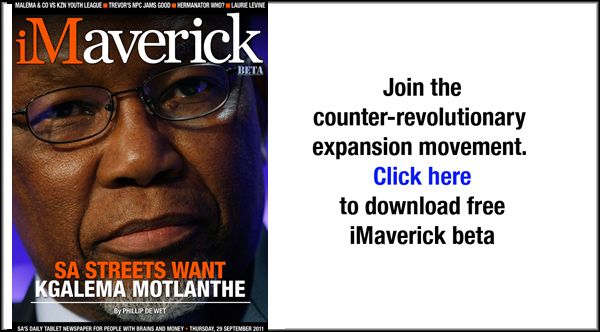Politics
Social Development backlog fails the chronically ill

Impoverished, chronically ill South Africans are falling through a “massive hole” in the social welfare net, says civic organisation Black Sash, and government is failing these people by not dealing with a massive backlog in social grants. As many as 40,000 people with illnesses like HIV, TB and similar debilitating conditions, who are need money to survive and for transport to treatment clinics, could be left destitute. By MANDY DE WAAL.
There are tens of thousands of people in South Africa who have what is termed a “functional disability”. They have a chronic illness like HIV or TB and cannot work, but manage the basic vagaries of trying to get on with their lives as best they can. They can wash, make food and are mobile enough to get transport to the nearest clinic where they get medication that helps stabilise their condition. In some cases, this treatment may even save their lives.
Given these people are not employed, they rely on social grants for the transport costs that take them to clinics. They also need money for the basic essentials of life like food, shelter, water and electricity.
However, as many as 65,000 people are going without the social grants they desperately need because despite promises to the contrary, the Department of Social Development has failed to clear a massive backlog of appeals for grants. According to the department’s own statistics, some 60% of these appeals are from people who are chronically ill or functionally disabled.
The Black Sash and the Legal Resources Centre recently launched legal action against the department to force its hand in this impasse, but despite agreeing to a 30 September 2011 deadline, the South African Social Security Agency (Sassa) failed to deliver.
“The tragedy is that most appeals are submitted by vulnerable and marginalised people, many of whom are disabled or chronically ill and can’t easily access the legal help they need to enforce their right to administrative justice. Taking the government to court was not something we did lightly but unfortunately litigation was the only route left open to us to secure the Constitutional and statutory rights of tens of thousands of vulnerable people to an appeal,” says Black Sash advocacy programme manager Ratula Beukman.
The Social Assistance Act of 2004 stipulates that the minister of social development was required to set up a tribunal to hear assistance appeals by applicants. Beukman says that a scanty tribunal was hastily convened in 2008 and that at the time, there were some 65,000 appeal cases that were not seen to.
Sixty percent of these cases (or as many as 40,000 people) are functionally disabled and have gone to a state medical practitioner that has done the necessary assessment to determine that these people are eligible for a grant.
“The problem is that when these people go to Sassa, they are rejected because by Sassa’s assessment people with chronic illnesses are not considered disabled,” she says. “Black Sash offices across the country have been flooded with appeal cases, and it became both obvious and urgent that we needed to deal with the department’s institutional framework to try and remedy the situation,” adds Beukman.

Ratula Beukman, courtesy of the Black Sash
The Black Sash says that one of the biggest problems is that there is no coherent or uniform assessment tool for disability. This is further complicated by the fact that assessment tools are not uniformly applied to all provinces.
“The Sassa offices in different provinces apply these assessment tools differently, and people have a right to lodge an appeal,” says Beukman who adds that the current system means that people have to become so ill that they are disabled before they are eligible for a grant.
“What must these people do? Who will look after them? It is their constitutional right to ensure they get access to medication. But where are they supposed to get the money they need to get transport to clinics. Without the proper diet they cannot take their medication anyway. This is a gross violation of human rights,” says Beukman.
“The current system basically forces those who are chronically ill to become disabled before they are able to secure any form of income support. Helping sick people who are battling the dual hardships of poverty and illness to participate meaningfully in society is not just our constitutional duty, it also makes social and economic sense. Allowing people to become functionally disabled and unproductive costs us all more and also puts an added strain on our already over-burdened public health system,” she says.
Nkosikhulule Nyembezi is a Black Sash Advocacy programme manager who deals with the human suffering brought on by the Department of Social Development’s inability to deal with this problem. He says that in the Eastern Cape, the government’s failure could even hasten the spread of drug resistant TB.
“In Port Elizabeth we have people who go to the TB stability hospital in the city. Because of the outbreak of extremely resistant TB, it is crucial that people do get medical treatment. But without social grants it is difficult, and even at times impossible, for them to keep up with their appointments. This is because the Eastern Cape has problems with transport facilities that should go collect people and take them to clinics,” says Nyembezi.
“TB is a communicable disease and even the threat of XDR-TB (extensively drug-resistant tuberculosis) is real because of the conditions these people live in. What you see in this situation is that people move from being functionally disabled to being progressively worse. They have to get someone to look after them, and this is usually a family member who is exposed to TB and the threat of this family member getting TB is very high.”
The Black Sash has given the social development department until 30 November 2011 to clear the current appeals backlog and until the 31 December 2011 to provide a final report confirming that this has been done in accordance with the terms of the settlement order.
Daily Maverick put in a number of calls to the Department of Social Development’s media spokesman for comment, but at the time of going to publication, no response was forthcoming.
Read more:
- 15 million on grants, but SA not a welfare state yet on BusinessLive.
Photo: REUTERS






 Become an Insider
Become an Insider